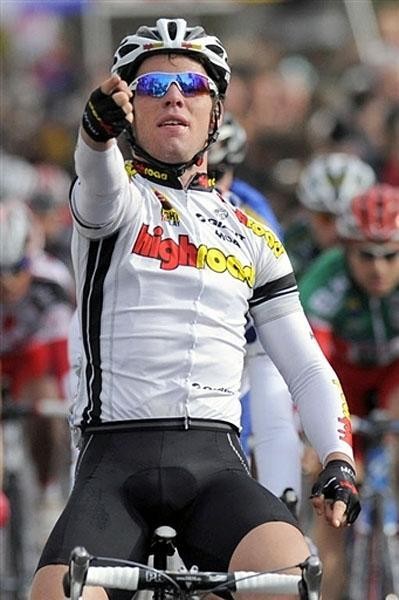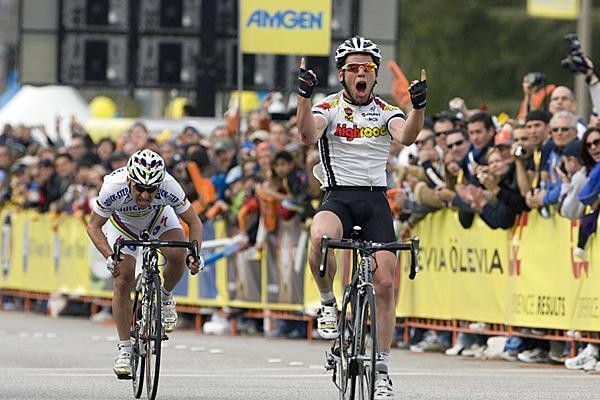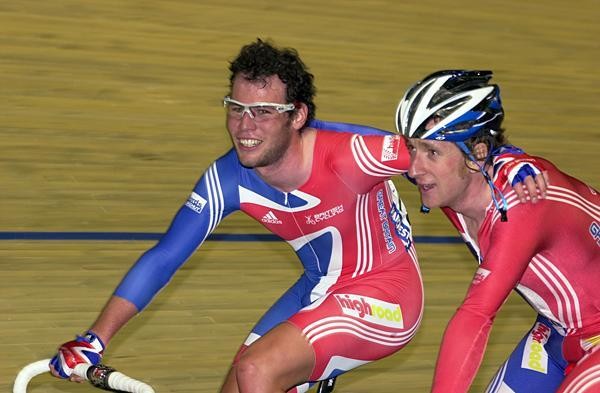Cavendish the first
When Mark Cavendish popped onto the world-class podium in 2007 he was deemed the next Robbie McEwen....






An interview with Mark Cavendish, April 16, 2008
When Mark Cavendish popped onto the world-class podium in 2007 he was deemed the next Robbie McEwen. Tough shoes to fill,but in only his second year as a professional, the High Road sprinter from the Isle of Man in Great Britain has already celebrated some of the most astounding victories in his young career. Cyclingnews' Kirsten Robbins spoke with the newly crowned world Madison champion after his pre-season training camp in San Luis Obispo, California to find out if his career schedule, prepared at age thirteen, is on target.
"I aspired to be like McEwen when I was younger," said the twenty-one-year old current Madison world track champion. "But when someone asks me that now, I tend to think to myself; I'm not the next McEwen, I'm the first Mark Cavendish – but if I get to do what he's done in my own career, I'd be really happy with that."
Without cycling history in the Cavendish family, the Brit went to his local cycling league by himself to see what he could accomplish. "Ever since I was a kid I just liked to be on my bike," said Cavendish. "When I was twelve I only had a BMX and everyone else had a mountain bike and I was doing laps around them on this little circuit. So I asked for a mountain bike for me birthday. I went down the day after and I won again so cycling [racing] carried on from there."
His athletic ability stemmed from growing up in a household where being active through organised sports was a priority. "My parents were supportive about getting me involved in sport, no matter which one; football or cycling or any sport I chose. I think I'm lucky to have had that support from them."
It was not hard for the British cycling federation to spot the talent, who won every national title offered in the junior level. "When I was in my second season ... I won a lot of races," said Cavendish. "I know I was very young but that's when I figured I could make a job of it on the road and track. I won the road, time trial, pursuit and everything else. I made a plan then for what I was going to do with my life."
The youngster's intensive career plan included cycling competitively until he was sixteen and then skip his two junior years in order to take on a full time job in the local Barkley's Bank to earn enough money over two years to support his move to Europe and transfer his full time energy into competitive amateur racing at eighteen.
Get The Leadout Newsletter
The latest race content, interviews, features, reviews and expert buying guides, direct to your inbox!
"I knew I was going to leave school at the compulsory age of sixteen and work in a bank for two years to make some money, because you obviously can't get a pro contract that young as a British rider or as a junior anyway," Cavendish smiled and saw no reason to race the junior ranks. He had watched his fellow junior riders leave school to train full time at sixteen, only to burn out before they turned amateur. "Even though I was working, I still trained a little bit and I raced on the weekends. I still won national championships but I wasn't too serious.
"I wanted to move to Europe with the idea of being a good amateur and turning professional after that," continued Cavendish, who eventually moved to Belgium with the newly organised British U23 development program in 2003. "Some of the program's selectors didn't want me to be a part of it because I hadn't raced much as a junior but my coach Rod Ellingworth, who's still my coach now, was a part of the selection process and he gave me a chance because I had won so many national titles in previous years – I will always think that this program was something that was fortunate for me."
Joining T-Mobile
Cavendish moved through the amateur ranks with an untrained, seventy-nine kilogram figure, compared to his current sixty-six kilogram sprinter's frame. According to the hardworking fast man, it was his diligent training and drive to be successful that led to his 2005 Madison world championship victory in Los Angeles, California, with his partner Rob Hayles.
When asked how much of his early career success he believes to be based on natural talent his answer is simply 'none'. "I don't think I have a natural talent for cycling, I think I'm just in love with it," said Cavendish. "I love riding my bike and I have focus and drive that enables me to do it really [well]. I don't think I'm that talented really; I work hard and I'm fortunate to have grown up with a bike. I think that if you know where you're going to go in life, you're going to get there."
Cavendish spent his neo-pro years with the German team Sparkasse before signing his first professional contract with T-Mobile in 2007. According to Cavendish, he had a verbal contract with the former magenta squad two seasons earlier, binding him to their development program to take advantage of the attention he needed to move up through the ranks of pre-professional bike racing.
"In my first year with T-Mobile, I didn't get a lot of opportunity to sprint for myself and I did a lot of team duties," said Cavendish, who attributes his quickly learned sprint tactics to his domestique work for T-Mobile. "I got sick and wasn't able to ride a bike for one month, not a good way to start. But, I trained hard and Alan Peiper gave me an opportunity to sprint for myself in the Scheldeprijs-Vlaanderen – and I won."
A collection of rainbow jerseys
After that first neo-pro victory in Belgium, the results came pouring in during 2007, with wins in the 4 Jours de Dunkerque (stage 3 and stage 6), Tour of Catalonia (stage 2 and stage 6 , Tour of Britain (Prologue and stage 1 along with several green jersey victories leading to a second season's contract with the transformed Team High Road squad.
In a controversial decision he was stripped off his victory in the Tour of California's stage six for pacing back to the peloton after a crash, which left him winless in the Golden State. After the Tour of California he traveled with team-mate and world pursuit champion Bradley Wiggins to focus on the track world championships held on 'his' national track in Manchester. The pair of British Team High Roader's dominated the Madison together to earn the rainbow world champion jerseys in front of the home country crowd. According to Cavendish, although he is from Isle of Man, he has spent a lot of time racing and training on the Manchester track.
With a second world championship title added to his palmarès, Cavendish was targeting KBC-Driedaagse De Panne-Koksijde , where he ended up winning twice. Next up is the defence of his Scheldeprijs title on April 16 before taking on the Giro d'Italia, followed by the summer Olympics in Beijing on the track. According to Cavendish his acquired sprinting prowess dates back to the guidance he received with the British development program to which he owes his success. "I think joining the U23 British team was the best thing that ever happened to me and I still say now that that's the reason I turned professional," Cavendish stated. "I gained so much from that because of the structure given to my training and my lifestyle. I progressed so quickly and I know how fortunate I was to have that opportunity and I'll never forget that. I always knew I'd go to the Olympics and I hope I will perform well there for my team and country."
The High Road experience
Cavendish is one of two young sprinters that have contracts with Team High Road. He and Gerald Ciolek, recognised for his 2006 U23 world championship victory in Salzburg, Austria, raced in their amateur years against each other. According to Cavendish the pair of sprinters compliment one another and enjoy tag-teaming the competition with one kilometre to go.
"We share the load," Cavendish said, who claims to be more explosive than Ciolek, who is much more well rounded and can hold a lengthy sprint. "I'm just a sprinter and I can't do anything else. When we race together we work so well together because of that."
"We have massive confidence in each other. If you have to lead out a guy and you have no confidence in him then it doesn't tend to work out. So we always give each other one hundred percent. We decide during the race who is feeling better for a sprint and some times we decide it when we are [only] six kilometres from the finish line."